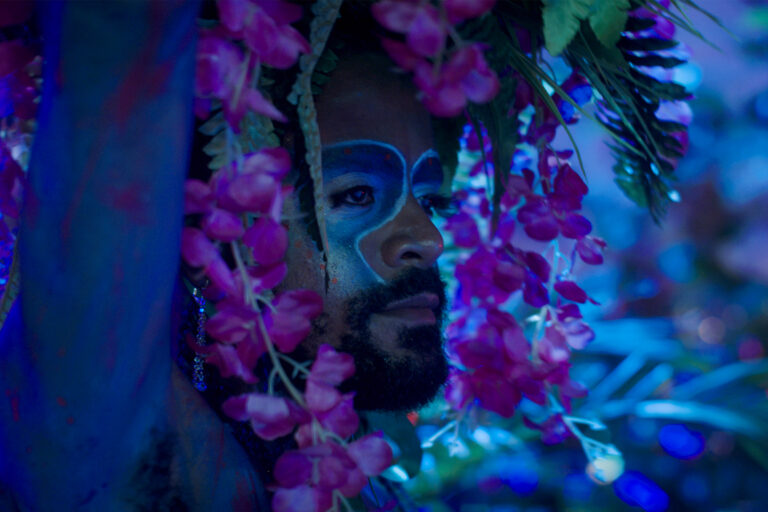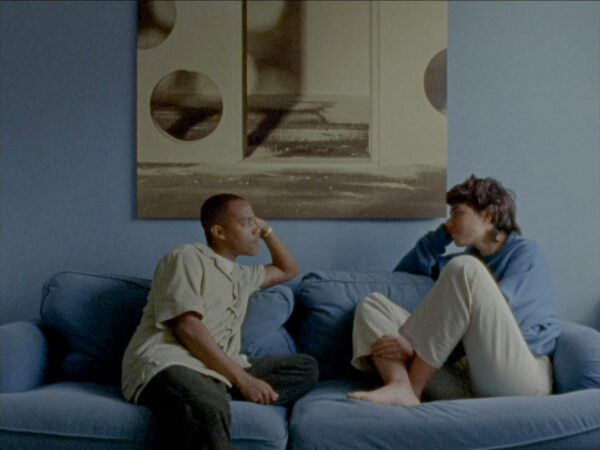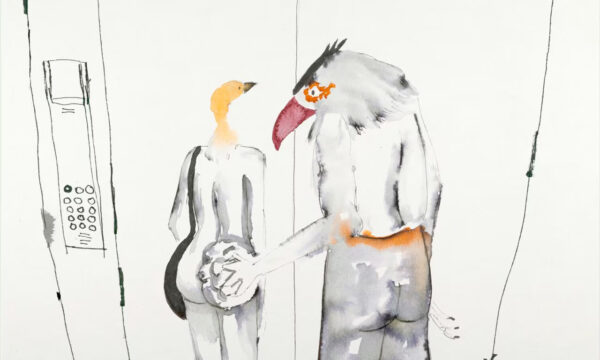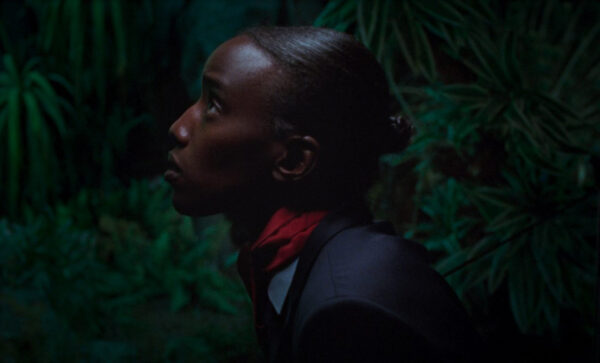Love and Fiction, Our Saviours!
Flores del otro Patio
In the north of Colombia, a group of queer activists use extravagant performative actions to denounce the disastrous exploitation by the country’s largest coal mine.

The winner of the International Audience Award at Glasgow Short Film Festival, Flores del otro Patio carries every mark of a Jorge Cadena film: from the uncompromising attention to people’s silences and faces in equal measure, the magnetic pull of his close-ups, to the sometimes still, sometimes mobile whirlpool of the camera’s presence. But if one had to single out a more direct predecessor, thematically, that would be his 2018 short The Jarariju Sisters. The film recounts a journey that feels as impossible as it is urgent, a quest for freedom and justice where the personal is inextricably tangled with the social.
If The Jarariju Sisters abounds with naked, desert landscapes which provide the viewer’s (potential) first sight of the La Guajira region in Northern Colombia, the storytelling is somewhat veiled. A missing water source, a river cut off, and industrial violence to blame: these are the realities that punctuate the film’s narrative. They do so sharply, at once, when visuals and sound — wind gusts and the mythical speak narrated by the characters — only hint at it. In a way, Cadena’s films always rely on a thinly veiled political reality to excavate the salubrious qualities of fiction filmmaking.
In his latest, Flores del otro Patio, this reality is as pressing as possible. But Cadena opts for another kind of protest, this time not from the centre, but at the intersection. The characters in Flores are young, Black queer activists who live, love, dance, fuck, and fight against injustice with the same flair they do the aforementioned activities. Even if we, as viewers, never learn their names, the most important ones are clear: La Guajira, the Rancheria river, the Wayuu people. Their first mention, however, is purposefully mediated, in the short’s opening scene, where sounds and voices overlap to signal the intermingling of reality and fiction.
“It’s 7 AM,” a reporter’s voice announces. A figure is sitting on the bed, looking out the window. A naked body, a bare back, long, braided hair, and morning calm interrupted by the news from a distant source. Is it tv, is it radio, or just the world chugging away? The breeze is palpable both inside the room and out, until the breath of air becomes the breath of a kiss. Bed creaking under the slow, lazy movements on top: another figure rises, arm gently resting on the other. Coming closer, they intertwine, two shadows in the faint morning light, the sound of skin rubbing against skin feeding into the curtains blown by the wind. Different textures, same light and all-encompassing touch. Surface to surface, all is intimacy. In addition to the morning light and birds cawing, there is a voice narrating a sombre news report: the indigenous Wayuu community issues a call for protest against the coal mining company plans which aim to alter the course of the Rancheria river. Some community leaders have already died under mysterious circumstances.
In the parallel reality of Flores del otro Patio, the troubles are the same as in the ‘real’ one. The course of Rancheria has been a point of dispute since the 1950s when the first dam construction plan was proposed. In the purported irrigation plans, even then the indigenous people foresaw the gradual appropriation of the river to landowners and the coal mine industry. It is no coincidence, since the world’s largest open-pit coal mine, Cerrejón, is not far. Water scarcity, corruption, and mismanagement, have hit indigenous communities the hardest. No surprise that the harshness of this reality is the ever-present undercurrent of the short’s fictionalised narrative. But in that moment, that morning, the world can wait for one more kiss. And it’s a kiss we see from above, a bird’s eye view to match the birds singing somewhere close by; a kiss we see upside down, in a long, static take. The men are faces, the men are lips, and their prolonged, passionate kiss seems to delay the inevitable in an act of affectionate (but very much temporary)deferral.
In addition to layers of sound, reality has to penetrate some of the most striking visuals that teether on the brink of stylisation. Cadena’s protesters are masked in public for their own safety, but maskless in private. And what masks they wear! Each and every one of them is a work of art, a concatenation of beads, pearls, feathers; a mosaic of glitter, gems, and holes (for the eyes and mouth, of course). Endowing such a mask is already an act of resistance, a separation from the ordinary, rigid reality, and a promise of change. A lot can be said about the symbolic nature of masks in the context of indigenous, religious, quasi-religious, and political practices, but I choose to leave such pleasures to the viewer. Instead, I suggest we approach our masked protagonists with a gentle, but insistent scrutiny of the aesthetic, rather than the ethical kind. For they are already heroes, who stand up to a regime with their bodies, their glitter, whether they are masked or not.
That is why the protest scene itself distorts and refracts reality: what starts as a perfunctory speech hitting all the talking points about economic growth and progress as a form of care, ends up a spectacle of enigmatic initiation. “A progress of violence,” they call out. The lights are dimmed theatrically and most of the scene unfolds as a beautifully-lit chiaroscuro; white powder (flour?) is blown in the faces of the lying spokespeople who are held tightly in close-ups, and the protesters issue an urgent, beautiful, and powerful calling against the vicious status quo. By calling themselves ‘flowers from another garden’ (as per the title), the group of queer activists remind us that growth should be organic, and that separation is as detrimental as drought.
Another way the film cuts through its fictional and realistic layers is by coming back to a visual assemblage that is both familiar and unique in its lighting, composition, and colour. Throughout the runtime of Flores, a similar image appears as a haunting presence. Shots, identical in their stillness, composition, colours, and light, seem to bracket the handheld, dynamic sequences of action. A long, static take of expressive immobility sees an ornately masked face central-frame, possibly in direct address. It’s dark, but not too dark, the background soaked in deep, desaturated greens; the contours are visible and sharp, suggesting the moon as a light source. And the masked figure is always seen amidst a particular kind of greenery, be it reeds or tropical spartina, their verdant presence demarcating a water source that is otherwise absent in both the film narrative and in reality.
The wind rustles the leaves as they make a slapping noise every time they touch the masked face, unmoving. Sounds are hyperbolically loud, birds, flapping; layers and layers of organic noises with the volume up just to the point where the sound design is not escapist, but conveys a heightened sense of realism, the cinematic kind. These shots are rich in complex feelings: danger, vulnerability, protective urges, stoicism, and mystery. Such ambivalence echoes the multiple silences, interspersed in between violent eruptions and form a hybrid reality.
In a way, Flores del otro Patio signifies the in-between—between destruction and salvation, between hope and despair, between documentary and fiction—and the proximity of these supposed opposites is highlighted in stylistically provocative ways. That in-between is equally strange and powerful in its allure. But even with the marks of queer resistance, that very reality is not queered. No, it’s already queer, whether some want it or not. In a work of intersectionality, love, desire, activism, Jorge Cadena, yet again, shows us how they are all related not only to each other, but also to the notion of change. Love, too, is already a revolution.





There are no comments yet, be the first!